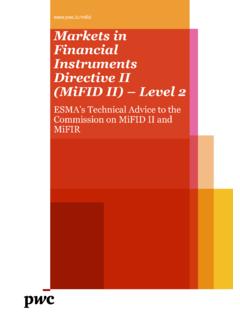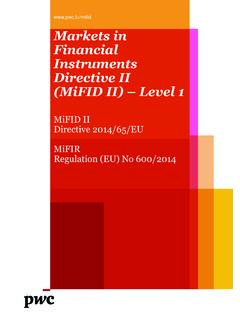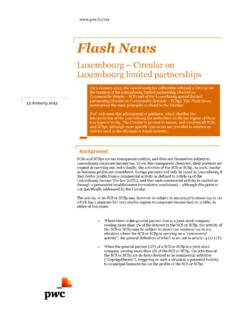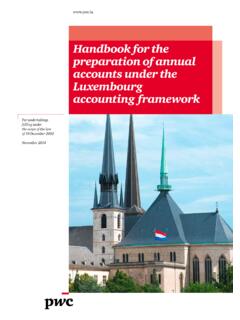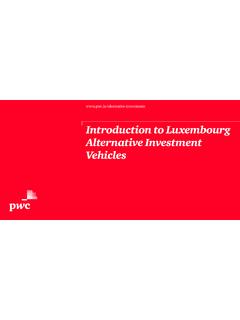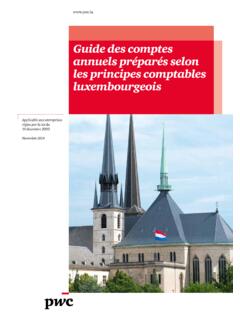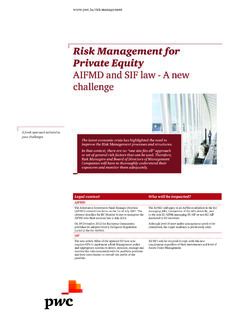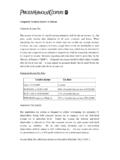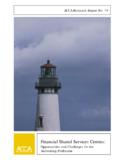Transcription of Luxembourg income taxes 2016 - PwC
1 Luxembourg income taxes 2016 Guide for of ContentsBasic principlesEmployment incomeDirectors feesDividend and interest incomeCapital gains 12345p4p7p8p8p9 Deductible itemsReal Estate incomeSocial SecurityNew tax measures in 20166789p10p11p13p144 Basic principlesResident vs. Non-residentsResident taxpayerAn individual taxpayer qualifies as resident of Luxembourg when he has his tax domicile or usual abode in Luxembourg . Nationality is irrelevant when determining tax residence. A tax domicile is the permanent place of residence that the individual actually uses and intends to maintain. Individual taxpayers who don t have their tax domicile in Luxembourg will qualify as a resident if they have a usual abode in the Grand Duchy.
2 To qualify for a usual abode status, a person needs a continuous presence of six months in Luxembourg (short absences are disregarded). The six-month presence can overlap two calendar years. The residence applies as from the first day of taxpayerAn individual taxpayer qualifies as a non-resident of Luxembourg if he has neither his tax domicile nor his usual abode in Luxembourg . Luxembourg residents are taxable on their worldwide income , while Luxembourg non-residents are taxable only on their Luxembourg source taxpayers are in principle not entitled to the same range of deductions available to Luxembourg resident taxpayers.
3 Non-residents, who are taxable in Luxembourg on more than 90% of their worldwide income , can opt to be treated as if they were Luxembourg residents. For Belgian residents, the option regime can be applied if 50% of the household s professional income is taxable in Luxembourg . The option regime allows non-resident individuals to deduct expenses via their Luxembourg income tax return that they would not otherwise be entitled to deduct. The tax benefit of the option regime has to be considered on a case-by-case yearIn Luxembourg , the tax year corresponds to the calendar subject to taxesThe categories of income , after deduction of related expenses, are aggregated to determine the net total income .
4 The net income is then reduced by various deductions so as to determine the taxable income : Employment income ; Self-employment income ; Dividend and interest income ; Capital gains; Pension and annuity income ; Rental and royalty income ; Business income ; Agriculture and forestry income ; Miscellaneous income ;1 Questions & answersWhat if my family remains in my home country?If your family remains in your home country, the tax authorities should refer to the relevant Double Tax Treaty if any, to determine your tax class 2 Married taxpayersSame as a resident if not living apart and if taxable in Luxembourg on more than 50% of their household's total professional incomeWidowed persons for the three years following the year in which they became widowedSame as residents2 Divorced or separated individuals for the three years following the year of divorce or separationSame as residents2 Civil partners and married same-sex couples who live together for a full fiscal year who elect to file jointly and have a recognised partnership in place for the full yearSame as residents if the Luxembourg
5 Professional income derived by either partner exceeds 90% of his/her professional income in Luxembourg for the full yearTax class 1aWidowed persons not included in tax class 2 Same as residents2 individuals aged at least 65 on January 1 Same as residents if specific conditions are met2 Single parents where the child forms part of their householdMarried taxpayers not living apart and taxable in Luxembourg on 50% or less of their household s total professional income2 Tax class 1 Taxpayers not included in tax classes 2 or 1aSame as residents2(1) In addition, child allowances may be granted by the Caisse Nationale des Prestations Familiales.
6 (2) If they derive professional income taxable in ratesIncome tax rates are progressive. They vary from 0% up to 40%. A 7% surcharge for the Employment Fund applies on the income tax due. The surcharge for the Employment Fund amounts to 9% for taxpayers in tax class 1 or 1a with taxable income exceeding EUR 150,000 (EUR 300,000 for taxpayers in tax class 2). Temporary Budget Tax amounting to applies to professional income and benefits ( pensions), as well as on capital income taxable in Luxembourg for both resident and non-resident taxpayers. The maximum rate applied on employment income amounts to classesThe calculation of Luxembourg income taxes also depends on the applicable tax class, established according to the individual s personal situation.
7 There are three tax classes: tax class 2, tax class 1a, and tax class net taxable incomeTax liability depending on tax classeEUR 30,000 EUR 60,000 EUR 120,000 EUR 240,000 Tax class 1 EUR 2,790 EUR 14,384 EUR 39,625 EUR 91,697 Tax class 1aEUR 950 EUR 13,352 EUR 39,006 EUR 91,078 Tax class 2 EUR 307 EUR 6,164 EUR 29,495 EUR 79,9886 Questions & answersShould I file jointly with my spouse?Yes. Married taxpayers file jointly (with specific conditions to be met for non-residents). Civil partners who have a partnership agreement recognised in Luxembourg and who were living together for a full tax year can elect to file jointly (certain conditions apply for non-residents).
8 What else do I need to know about filing obligations? In Luxembourg , not all taxpayers have to file an income tax return. But those who have, must file it prior to 31 March of the year following the income tax year (extension of this deadline is typically granted upon request). If the taxpayer is not subject to a filing obligation, he may file a simplified request for refund of excessive withholding under certain conditions. The purpose of such a request is to obtain a refund of excessive payroll taxes (if any). This request must be filed prior must be filed prior to 31 December of the year following the income elements taken into consideration to determine if a taxpayer has to file an income tax return or request for a yearly calculation are: His/her residency status; His/her tax class; His/her level of income ; The nature of income .
9 The number of days worked in December 2016 Deadline for filing the simplified request for tax year 2015 (withholding tax adjustment)31 March 2016 Deadline for filing tax returns for tax year 20157 Employment incomeTaxable employment income generally includes all benefits in cash or in kind earned from an employment activity. The taxable value of benefits in kind is assessed at the fair market value ( the cost that the employee would have paid if he had paid for the benefit himself). Luxembourg income Tax Law, however, provides for a lump sum valuation method or exemptions for certain benefits in kind:Luncheon vouchersThe taxable benefit per voucher is equal to EUR for a voucher value of EUR minimum.
10 The taxable basis is reduced to the extent that the employee contributes to the related carThe taxable fringe benefit generated by the private use of a company car is equal to the private mileage multiplied by the kilometre cost of the car. A logbook indicating private mileage is to be held by the employee. Alternatively, a lump sum valuation method is available, according to which the monthly taxable fringe benefit corresponds to of the price of the new vehicle reduced by any discount granted (options and VAT included).Free accommodationThe taxable fringe benefit amounts to the monthly rent and other rental charges paid by the employer.


